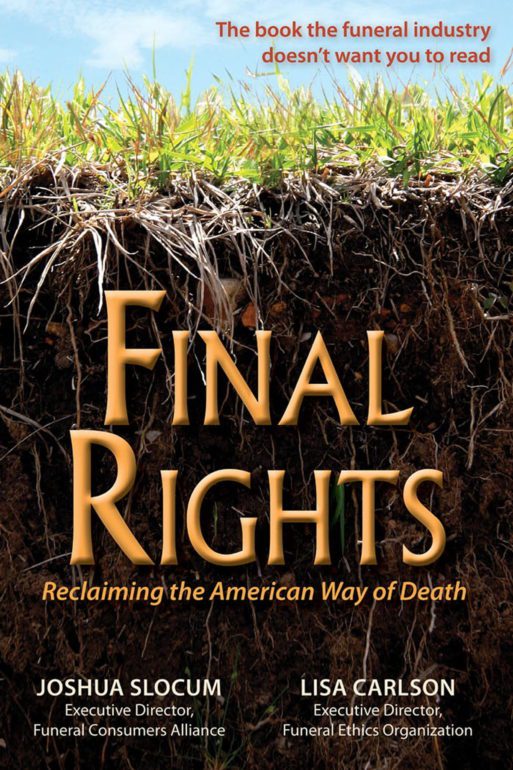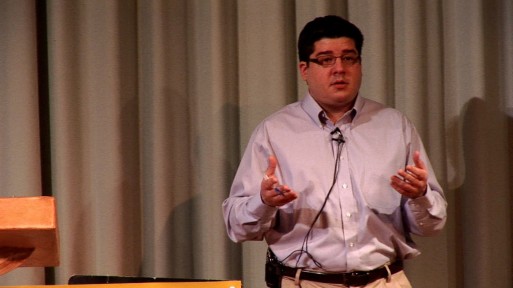 Joshua Slocum’s and Lisa Carlson’s book, Final Rights: Reclaiming the American Way of Death, is one part in-depth expose of all things deplorable and funeral, and two-parts step by step manual detailing the different states’ laws regulating this shadowy industry, which in some instances are so ill-conceived and ripe for exploitation as to verge on parody. The authors intend to prepare their readers fully for the choices and hazards they will face when dealing with the funeral industry, but this might be an even harder task than they give credit for. After all, how many people go through their daily lives even aware that there is a “funeral industry”?
Joshua Slocum’s and Lisa Carlson’s book, Final Rights: Reclaiming the American Way of Death, is one part in-depth expose of all things deplorable and funeral, and two-parts step by step manual detailing the different states’ laws regulating this shadowy industry, which in some instances are so ill-conceived and ripe for exploitation as to verge on parody. The authors intend to prepare their readers fully for the choices and hazards they will face when dealing with the funeral industry, but this might be an even harder task than they give credit for. After all, how many people go through their daily lives even aware that there is a “funeral industry”?
Until the worst happens, or seems will inevitably happen, price-inflating funeral homes and dishonest burial insurance salesmen remain far and unfortunately removed from the average citizen’s comfort zone. This is perhaps easily forgotten by those as involved in the funeral industry as Slocum and Carlson. The book sometimes suffers from an overly glib tone, employing such phrases as, “It’s time to bury the status quo in an unmarked grave,” and terming mausoleums, buildings in which dead bodies in caskets are entombed, “posthumous high-rises.” One can’t easily imagine a person casually interested, or, even worse, a person anticipating a death, finding this sort of dark humor ingratiating.
That being said, any reader who thought of the funeral industry as a wholesome, semi-religious, semi-legal entity will be instantly and lastingly disillusioned of this notion. From the National Preneed Sales standard training guide (which advises the door-to-door salesman, after gaining entrance to the home, to “move to the kitchen,” and spend about 30 minutes there “developing a relationship that is warm and sincere” before pitching unnecessary and over-priced “burial insurance plans”) to the pricing shell games of standard funeral packages (which often come with a mandatory service charge, which is often arbitrarily marked up to a number of the funeral homes’ choosing), this is an industry that offers works such as these no lack of material.
“…any reader who thought of the funeral industry as a wholesome, semi-religious, semi-legal entity will be instantly and lastingly disillusioned of this notion. “
Final Rights is not the first in this genre. The most famous example is Jessica Mitford’s 1965 book The American Way of Death, which caused a sensation at its release, and largely precipitated the rise of what consumer protection there is now, and increased attention to, and membership in, advocacy groups such as the Funeral Consumers Alliance, of which Joshua Slocum is the Executive Director. This book was revamped and re-released in 1997, with new chapters detailing the FTC’s woeful attempts at regulating this industry, and the rise of a disgustingly exploitative handful of large-scale funeral home chains. Today, the American funeral industry offers an example of an almost stereotypically cutthroat corporate capitalism, an example of what can go wrong in the absence of regulation. The large chains, with innocuous, stock-market-esque names such as Services Corporation International, Stewart Enterprises, and the Loewens Group, are often the worst offenders.
“…the American funeral industry offers an example of an almost stereotypically cutthroat corporate capitalism”
In 2009, investigators discovered that a cemetery in Florida run by SCI was disinterring old graves, stacking the moldering coffins like cords of lumber in one corner of the property in order to make room for new burials. In July of the same year, a state audit found that one of California’s largest prepaid funeral trusts, the California Masters Trust, mis-spent millions of its customers’ dollars that had been set aside for eventual funeral or cremation expenses. Scandals like this erupt with surprising regularity. They are usually quickly forgotten.
For many readers, this is a relatively untold story, but as each of us is likely to have to deal with funeral providers at some point in our lives, it is vital knowledge for the general public. Unfortunately, the general public just doesn’t like to think about this sort of thing. Perhaps this explains the vacuum of effective regulation that has allowed such unsavory business practices to flourish.
“Unfortunately, the general public just doesn’t like to think about this sort of thing.”
Slocum and Carlson are not uncomfortable with this subject matter. Most readers, however, will be. This is not exactly the fault of the authors. Our country’s death dialogue, at least what passes for it, is defined by religiosity and squeamishness. Books like Final Rights could contribute to a changing perception, could lead to a new discussion, such as that which followed the publication of The American Way of Death. Mitford knew instinctively that, if she hoped for any number of readers at all, her approach must be calibrated to appeal to their sensibilities, through wry humor and a degree of prologue, an easing into the territory. Joshua Slocum and Lisa Carlson were unable to pull this off. Final Rights contains an undeniable wealth of valuable informative material. Sadly, this reviewer fears that few consumers outside of the death industry are likely ever to read it.
Related SevenPonds Articles:
-
Book Review: “Erasing Death” by Sam Parnia Explains How MDs Bring People Back to Life
- Classic Book Review: As I Lay Dying, by William Faulkner
- The Beauty of Retaining Keepsake Flowers From a Memorial Service or Funeral

 “Final Rights: Reclaiming the American Way of Death” by Joshua Slocum and Lisa Carlson
“Final Rights: Reclaiming the American Way of Death” by Joshua Slocum and Lisa Carlson



 Having an Estate Plan Is Essential – So Is Discussing It With Your Children
Having an Estate Plan Is Essential – So Is Discussing It With Your Children
 The Healing Sound of Singing Bowls
The Healing Sound of Singing Bowls
 “Summons” by Aurora Levins Morales
“Summons” by Aurora Levins Morales














